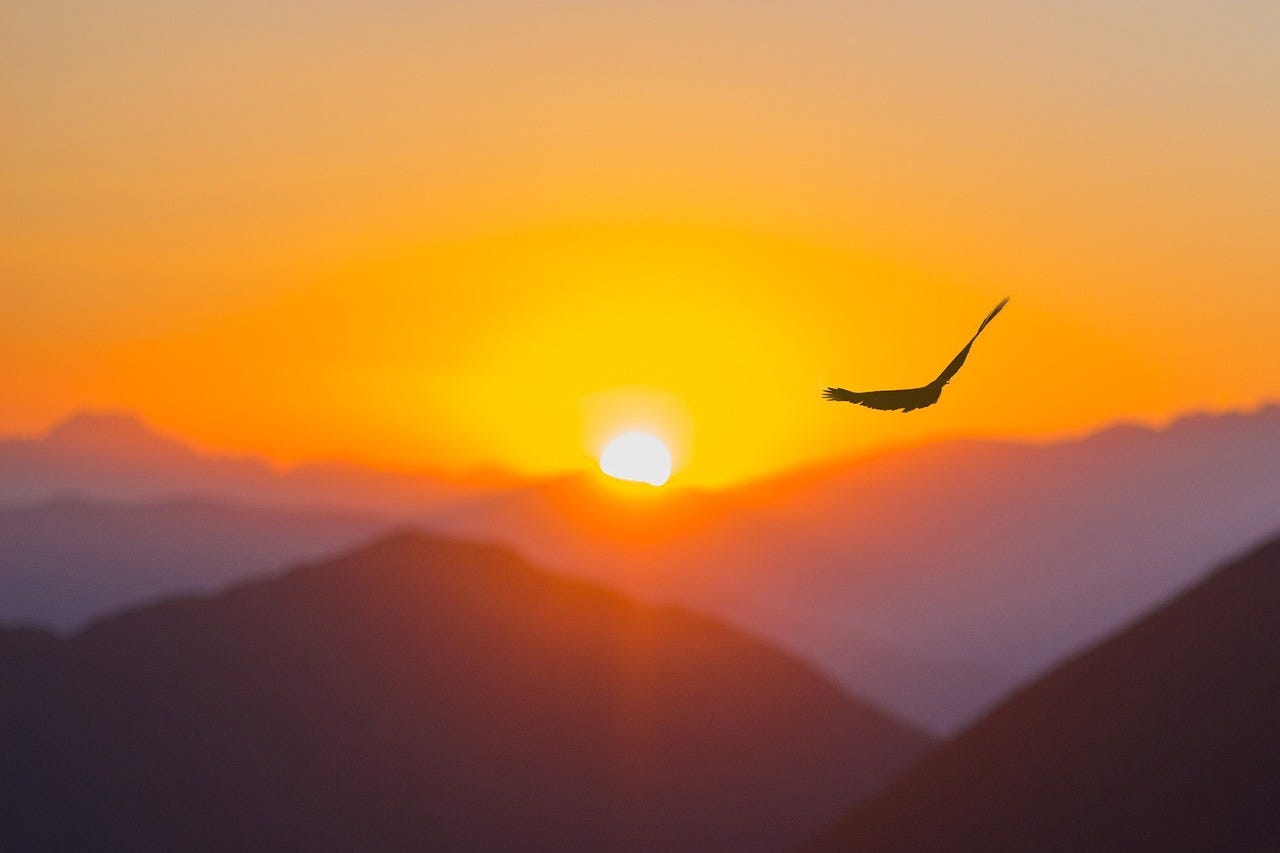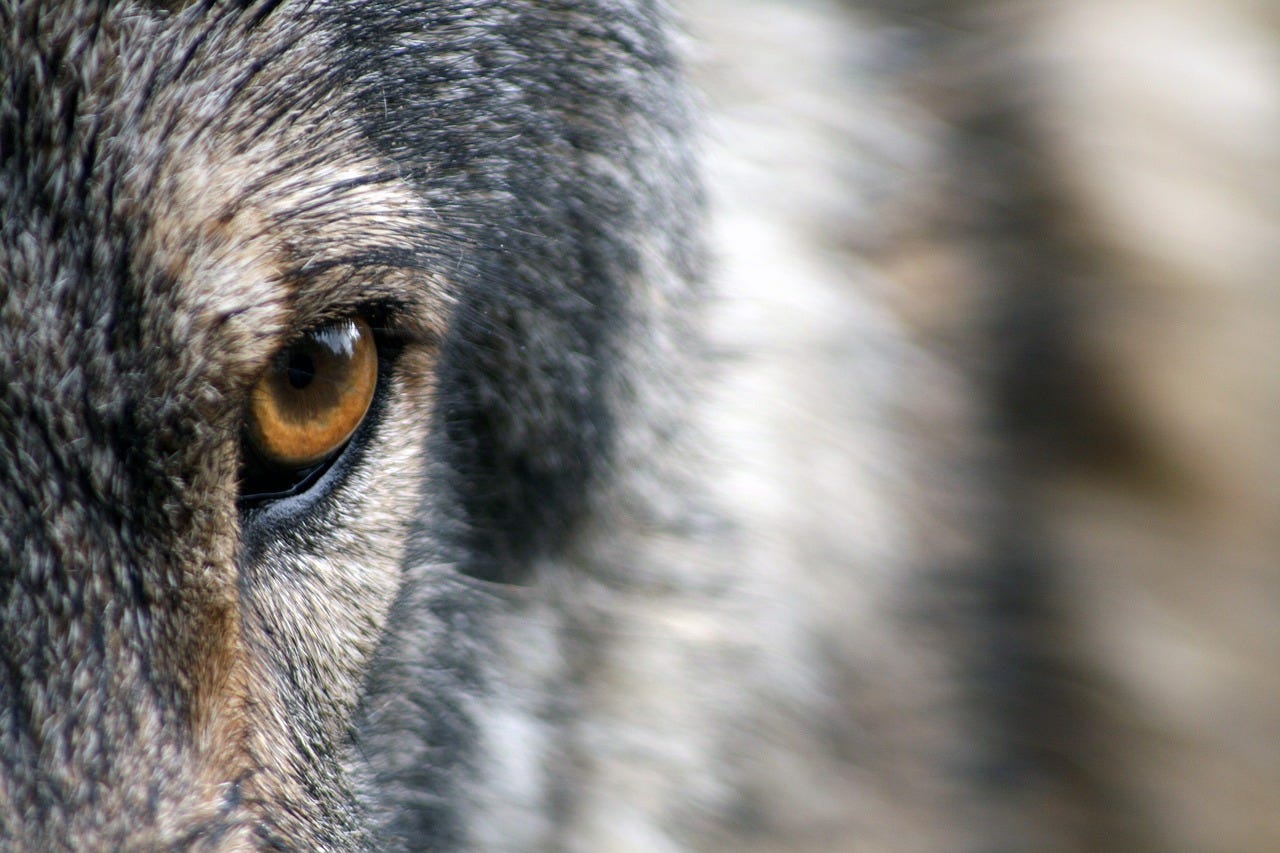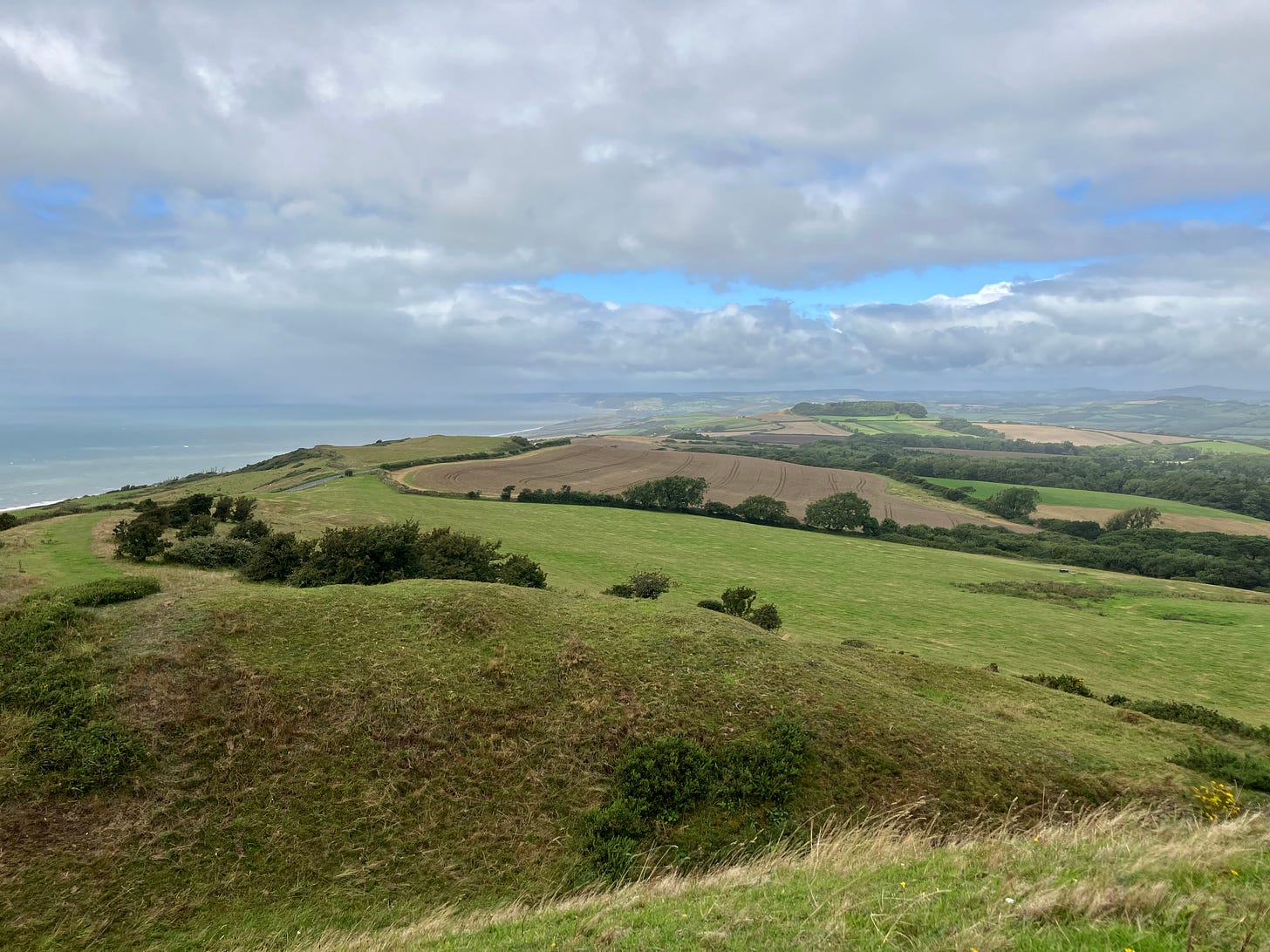And so it was that the weary travellers came upon a clearing. A space where the tangled woods opened out onto a lush, verdant glade where the scent of wildflowers and the gossamer wings of butterflies danced in the unusually luminescent air. The soft grasses gave way to a pool of sparkling water, inviting them to quench their thirst. With each footstep, the air seemed to twinkle with the peal of a thousand tiny bells, and in the crystal waters they saw a multitude of flickering lights humming around them. Yet when they looked up - nothing - only in the water’s clear mirror could these be seen. In the gentle ripples, one light grew more distinct, revealing a miniature winged being hovering around them. “Listen, listen,” came the whisper of a tiny voice. Mesmerised, they gazed intently and listened deeply as the magic of this place was bestowed upon them…
You decide what happens next - it’s a familiar scene in many an old yarn, fairytale or poem - the weary travellers arrive at a secret glade, dingly dell or enchanted clearing and experience a magical metamorphosis as a result of an encounter with a liminal being of some kind. These archetypal stories remind us that we can clear space to reflect and restore a renewed sense of ourselves and our direction in life.

It is thought that the English words, glad and glade, grew from the gnarly root of the Old Norse word Glaðr, meaning bright, shining. In a magical glade J.R.R Tolkien’s Lady of the Light, Galadriel invites Frodo to gaze in the mirror-lake that shows him his possible future, should he fail in his mission. Glades may also be formed by catalytic events such as fires or avalanches - the Bonfire Glade in The Fellowship of the Ring is created by a war between the malevolent trees of the Old Forest and the Hobbits. So spaces for change in our lives come about in multiple, mysterious ways.
It was in a clearing by a pool at the foot of Sliabh Mis, The Mountains of Mis in County Kerry, Ireland that the gentle harpist, Dubh Ruis, healed the madness of Mis with his musical ministrations and love-making. Mis had fallen into a frenzy of grief on finding the body of her warrior father Dáire Dóidgheal, defeated in his attempt to invade Ireland by the hero Fionn MacCumaill. Unable to revive him by licking his wounds, an act that earned her the title of Ireland’s first vampire, she flew away to the mountains to become a terrifying wild thing of claws and fur, capable of killing anything that crossed her path, including all the warriors sent by the king to capture her. Duh Ruis’s love and music heal her raging grief - her claws retract, her fur disappears and they return from the mountains to live a happy life together. Mis’s wild story remained hidden amongst the 34,000 books and manuscripts in Maynooth University Library in County Kildare, Ireland until 1954 and has been insightfully retold by Dr Sharon Blackie in her book If Women Rose Rooted.

Winging our way some 4300km/ 2672 miles from the Mountains of Mis, we alight on Mount Lykaion, in Arcadian Greece, whose twin peaks are sacred to two Gods - the omnipotent Sky God Zeus and the Satyr Pan, God of nature, fertility and music. Lykos can mean wolf and lykeois means light, and the tales surrounding the mountain embody the double-edged nature of both humans and Gods. In a lush mountain grove, Pan is said to have formed an idyllic, protected fold for animals pursued by wolves or huntsmen, maintaining the balance of nature. The dancing Goat-God is also ferociously fecund - the nymph Syrinx turns herself into reeds to escape his lust, which Pan transforms into the musical syrinx we know as Pan Pipes.
Legendary hunter-king, Arcas, namesake of Arcadia was revered for bringing the gifts of agriculture, weaving and bread to humanity. He was also said to be the twin brother of Pan, both born of Zeus’s rape of Callisto, a nymph of hunter-goddess Artemis. Callisto was also in some tellings the daughter of Lycaon, a King of Arcadia who founded the Lycaean Games, antecedent of the Olympic Games. Images of the double patrons, Zeus-Lykaios and Pan, were printed on either side of the coins of the Games.
On the 1358 metre southern peak of Mount Lykaion, an altar remains at the believed birthplace of Zeus-Lykaois and his son Pelasgus, who in some tellings as the first man fathered the Arkadians including Lychaon. In the valleys beneath the altar lie Pan’s sanctuary and the hippodrome for the Lycaean Games. Athletic displays on foot, horse and chariot were accompanied by initiation rites involving the sacrifice of male animals, whose fat-wrapped bones were burned, releasing aromatic smoke to the nostrils of the Gods. In a barbaric test of Zeus’s omniscience, Lycaeon offered the flesh of his son Nyctimus instead of animals. Zeus responded by resurrecting the sacrificed son and turning the father into a werewolf, a transformation known as lycanthropy, reenacted in the Lycean initiation rites, where young men drew lots to see who would eat human entrails and become a werewolf. Ancient accounts of this grisly ritual are bolstered by archaeological discoveries of a young boy’s bones amidst thousands of animal skeletons at the altar site.

In Ancient Greek eschatiai were marginal, wild spaces beyond human habitation where metamorphic transformations of light and shadow, brutality and tenderness could occur. In Plato’s Republic (388BC) Socrates likens Lycaon’s hubristic transgression of humanity, divinity and nature to the transformation of protector to tyrant - centuries later we still see what a thin line that can be. This rampantly masculine myth is an early warning about the consequences of the patriarchal dumping of humanity’s shadow onto nature - what the West continues to do daily on a vast, life-threatening scale. We don’t know how the wolves feel - it could well be a terrible thing to have a human changeling in their midst. Certainly we know that they have lost a third of their habitat and been driven to extinction in places including UK, Ireland and Japan by humans. If we listen carefully, alongside the barbaric trumpeting of might and power, we hear the lilting pipes played by the liminal being Pan, whose story teaches us to steward nature and harness our wild natures mindfully.
Mis, wild with a grief only nature can contain, is healed with love and music by her own version of Pan, who succeeds with gentleness where masculine bravado has failed. Whilst her story, like Lycaeon, warns of the dangers of losing command of ourselves, it also teaches that only by embracing our wild can we heal it - the patriarchal judgement, punishment, banishment and censorship of the wild feminine simply outlaws, alienates and enrages her further. Scientists tell us that we are at a tipping point to save our world - we must protect and honour the wild if we are to survive - and also the feminine, so often personified as Mother Earth. It’s both a collective and individual journey, as Nikita Gil writes “some days/ I am more wolf /than woman/ and I am still learning/ how to stop apologizing/ for my wild.”
We must love ourselves enough to make in our lives space to inhabit our fullest selves and allow the wild and the wise to meet and merge. The wise part of us must encounter, witness, love, embrace and be enervated by our wilder, raging, grieving selves. We must climb the mountains beyond the comfort zones of our daily existence, face our outlawed selves and bring them home. We must find the “few but precious… doors to the world of the wild Self,” described by Clarissa Pinkola Estés in her seminal book, Women Who Run with the Wolves - “if you have a deep scar, that is a door, if you have an old, old story, that is a door. If you love the sky and the water so much you almost cannot bear it, that is a door. If you yearn for a deeper life, a full life, a sane life, that is a door.”

At the edge… Chalk Cliffs on the South West Coastal Path to Durdle Door
At critical moments in my life I have embarked on long solitary walks to process powerful emotions, sweep my mind clear and make space for new directions. My spirit craves both the quiet, calm perspective of high vantage points and the wild struggle of getting lost along tangled paths. I rarely feel alone absorbed in nature and the sense that I trace the footsteps of innumerable walkers, questers and pilgrims. In her beautiful, brave books about her walking adventures with her husband, Moth as he struggles with a life-changing health condition, Raynor Winn invites us to"meet me there, where the sea meets the sky,/ Lost but finally free.”
Last summer I teetered along the fragile paths of Dorset’s Jurassic Coast, one slip away from becoming sea foam on the rocks far beneath. There’s nothing like balancing along the wild edges of nature to restore reconnection with the quick of life and the preciousness of each moment. For, whilst our everyday lives function in the hypnotism of continuous routines, in truth, we are always perched precariously on the thin line of existence. Facing this in a wild setting brings it home - which accounts for the thrill of extreme outdoor sports.
As a city dweller, I seek out the wild daily - an ice-cold run, peak moments of music-making or even just daydreaming whilst tree-gazing from my window can anchor me back into my essential, ever-changing wild self. When we listen and attend to that which whispers, calls, sings and begs to be heard from the deep inner spaces of our hearts and souls, we remember that we are wild things of nature and make space for our next magical metamorphosis.
Wishing you a wildly wonderful magical 2024
Katie Rose January 2024
This Ramble came into being as the result of a prompt in Beth Kempton’s Winter Sanctuary

The site of an Ironage Fortress, above Abbotsbury, Dorset





